Jonathon’s Story: From Survival to Stability
Living on the streets with my 8-year-old daughter was terrifying. Every day we struggled for water, food, and safety—but the greatest fear was losing her simply because we were homeless.
Living on the streets with my 8-year-old daughter was terrifying. Every day we struggled for water, food, and safety—but the greatest fear was losing her simply because we were homeless.
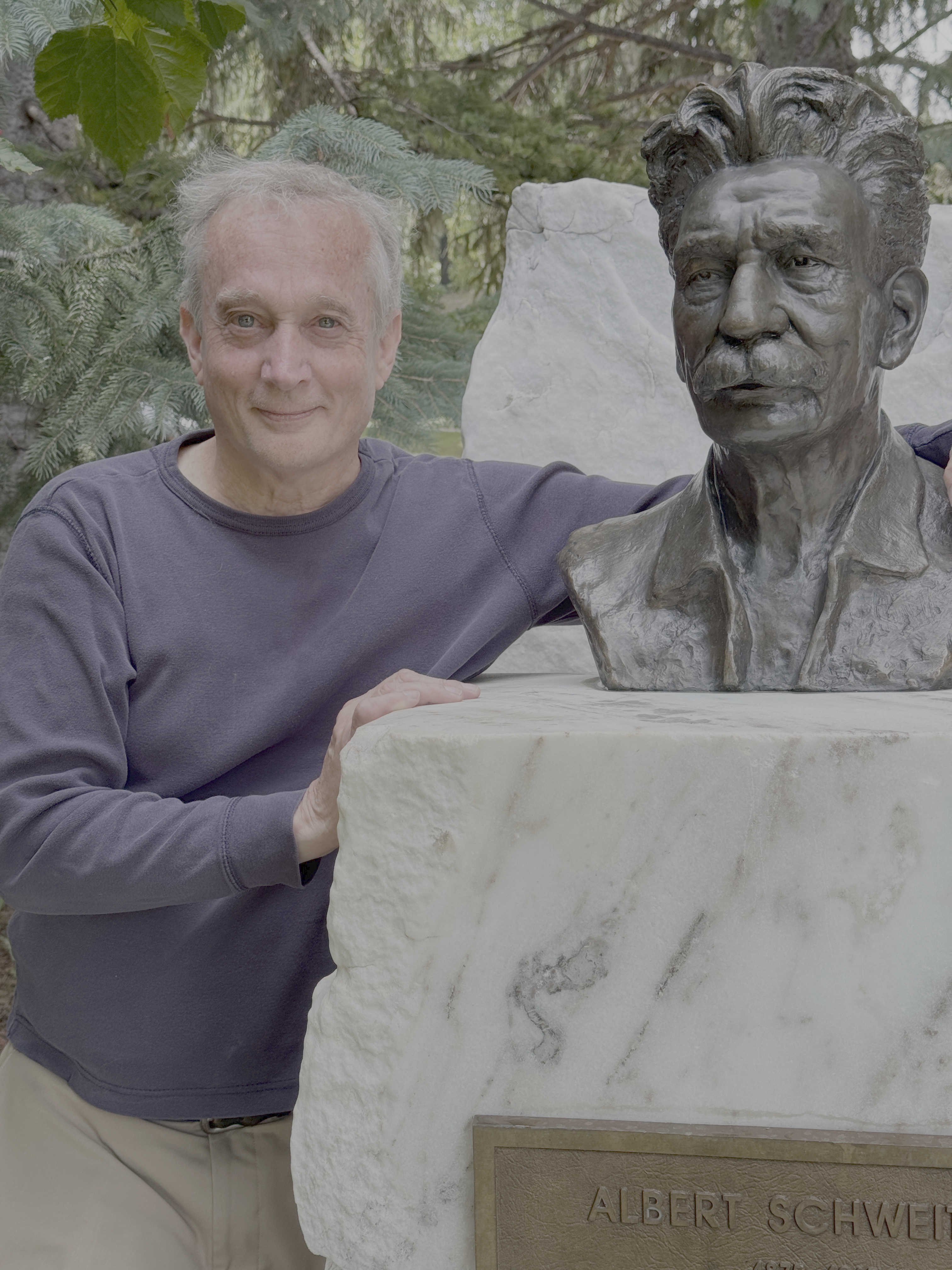 This past June 30th and July 1st, I was given the tremendous honor of being asked to speak in Aspen Colorado to commemorate Dr. Albert Schweitzer’s visit and lecture there in 1949. It was also Albert Schweitzer’s 150th birthday. For those of you not familiar with the great Dr. Schweitzer, he was one of us. His life of service as a physician in a remote clinic in what is now the nation of Gabon embodied his love for those without access to healthcare. With skill and dedication, he created a hospital in the tiny town of Lamberene, initially using an abandoned shed with no electricity or other resources. Earlier in his life, he was a renowned scholar and musician but chose to become a physician in order to more directly serve those in greatest need. Due to his German citizenship, he was captured during WWI, but his patients forced the French to release him to continue his work. In Africa, he had a mystical realization while watching hippos swimming into a river that led him to his philosophy of “Reverence for Life.” His living example and his writings and lectures became an inspiration to the world. Not long after his visit to Aspen (his only visit to the US), he was awarded the Nobel Peace Prize. Dr. Schweitzer was an inspiration to both me and my father, so I eagerly agreed to speak at the event. The more I read not just about Dr. Schweitzer's medical work, but his profound philosophy, the more I recognized the same core values we hold in street medicine. I have experienced, and heard many of you describe, a mystical experience when we see ourselves in the eyes of our sisters and brothers on the streets. My talk attempted to weave our reverence for the reality of those we serve together with Dr. Schweitzer’s Reverence for Life. Indeed, the two are essentially the same.
This past June 30th and July 1st, I was given the tremendous honor of being asked to speak in Aspen Colorado to commemorate Dr. Albert Schweitzer’s visit and lecture there in 1949. It was also Albert Schweitzer’s 150th birthday. For those of you not familiar with the great Dr. Schweitzer, he was one of us. His life of service as a physician in a remote clinic in what is now the nation of Gabon embodied his love for those without access to healthcare. With skill and dedication, he created a hospital in the tiny town of Lamberene, initially using an abandoned shed with no electricity or other resources. Earlier in his life, he was a renowned scholar and musician but chose to become a physician in order to more directly serve those in greatest need. Due to his German citizenship, he was captured during WWI, but his patients forced the French to release him to continue his work. In Africa, he had a mystical realization while watching hippos swimming into a river that led him to his philosophy of “Reverence for Life.” His living example and his writings and lectures became an inspiration to the world. Not long after his visit to Aspen (his only visit to the US), he was awarded the Nobel Peace Prize. Dr. Schweitzer was an inspiration to both me and my father, so I eagerly agreed to speak at the event. The more I read not just about Dr. Schweitzer's medical work, but his profound philosophy, the more I recognized the same core values we hold in street medicine. I have experienced, and heard many of you describe, a mystical experience when we see ourselves in the eyes of our sisters and brothers on the streets. My talk attempted to weave our reverence for the reality of those we serve together with Dr. Schweitzer’s Reverence for Life. Indeed, the two are essentially the same.
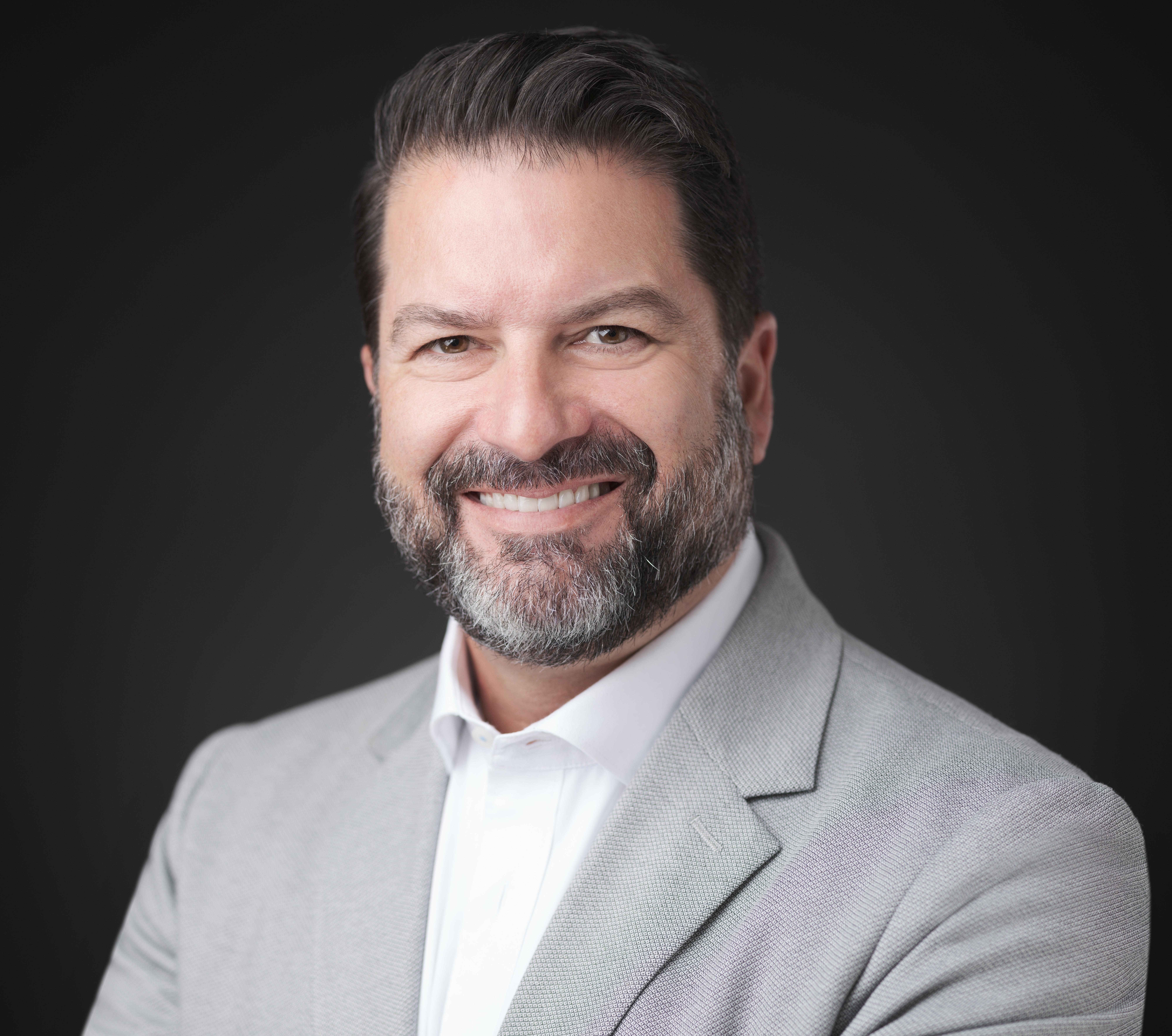 Jeff Olivet is an internationally recognized leader in public health and homelessness policy, with a deep focus on the intersection of housing, healthcare, and racial equity. As the executive director of the U.S. Interagency Council on Homelessness (USICH) from 2022-2024, he led federal efforts to address homelessness as a public health crisis, advocating for policies that integrate healthcare and housing solutions and that prevent homelessness before it starts. He currently serves as Senior Advisor to the Initiative on Health and Homelessness at the Harvard T.H. Chan School of Public Health and a consultant to numerous organizations in the United States and internationally.
Jeff Olivet is an internationally recognized leader in public health and homelessness policy, with a deep focus on the intersection of housing, healthcare, and racial equity. As the executive director of the U.S. Interagency Council on Homelessness (USICH) from 2022-2024, he led federal efforts to address homelessness as a public health crisis, advocating for policies that integrate healthcare and housing solutions and that prevent homelessness before it starts. He currently serves as Senior Advisor to the Initiative on Health and Homelessness at the Harvard T.H. Chan School of Public Health and a consultant to numerous organizations in the United States and internationally.

The Street Medicine Institute’s Seed Grant program furthers SMI’s mission of assisting communities to establish their own Street Medicine programs. The program facilitates and enhances the direct provision of health care to rough sleepers where they live by providing communities and clinicians with expert training, guidance, and support to develop and grow their own Street Medicine programs. We were delighted to have received a record twenty-nine deserving and qualified applications for the fifth year of this grant- evidence that street medicine is expanding across the United States.
Chastity Bowick is an award-winning activist, civil rights leader, and transgender health advocate. For seven years, she led the Transgender Emergency Fund of Massachusetts, which is the leading crisis agency for transgender communities in Massachusetts. Ms. Bowick launched Chastity’s Consulting & Talent Group, LLC (CCTG) in January of 2023. CCTG’s vision is to uplift and guide the transgender and gender nonconforming communities to be able to live a more adequate life with equal protections & opportunities and to educate everyone who provides services for those community on their needs and wants.
SMI’s goal is to assist early stage street medicine programs in the United States – particularly in areas not currently served by street medicine – advance toward a more sustainable level of operation. Supported by the generosity of the Pulte Family Charitable Foundation, two successful grantees will each receive an award valued at over $14,000 to include:
The Street Medicine Institute has been fortunate enough to have several volunteers make a difference in key projects over the past year. Please reach out to [email protected] if you are interested in volunteering with the Street Medicine Institute!
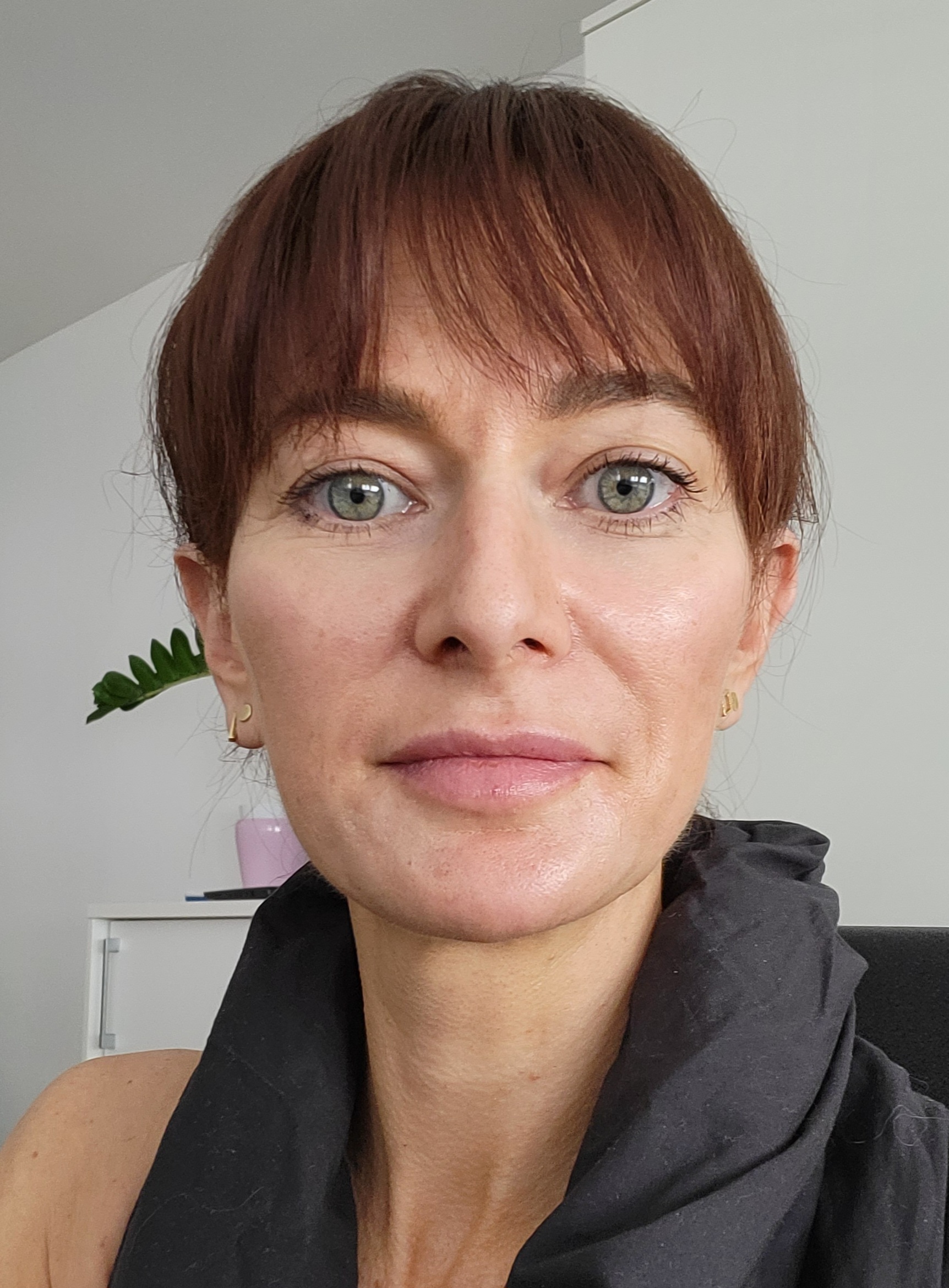 Steph Grohmann is an anthropologist with a background in social care. She has been studying homelessness and displacement for many years. More recently, she has focused on the extreme health inequities affecting people who are considered "out of place," such as people experiencing homelessness and refugees. Wearing many hats, she also works on developing fair and equitable research ethics practices in research with people who are socially excluded. She is the author of The Ethics of Space: Homelessness and Squatting in Urban England. Steph currently works at the University of Edinburgh and the Ludwig Boltzmann Gesellschaft in Austria.
Steph Grohmann is an anthropologist with a background in social care. She has been studying homelessness and displacement for many years. More recently, she has focused on the extreme health inequities affecting people who are considered "out of place," such as people experiencing homelessness and refugees. Wearing many hats, she also works on developing fair and equitable research ethics practices in research with people who are socially excluded. She is the author of The Ethics of Space: Homelessness and Squatting in Urban England. Steph currently works at the University of Edinburgh and the Ludwig Boltzmann Gesellschaft in Austria.

The Street Medicine Institute’s Seed Grant program furthers SMI’s mission of assisting communities to establish their own Street Medicine programs. Now in its third year, the program facilitates and enhances the direct provision of health care to rough sleepers where they live by providing communities and clinicians with expert training, guidance, and support to develop and grow their own Street Medicine programs. We were delighted to have received fifteen deserving and qualified applications in 2023.
It is with deep sadness the SMI Board of Directors mourns the loss of our colleague and friend, Dr. David Deci. It remains shocking to be thinking of Dave retrospectively - I still find myself wishing to discuss some nuanced matter with him or looking forward to seeing his face on the next zoom call and hearing about his post-retirement life in New England. We invite the SMI community to share your memories and reflections of Dave. These will remain as a memorial to him and to his tireless work for the unsheltered homeless.
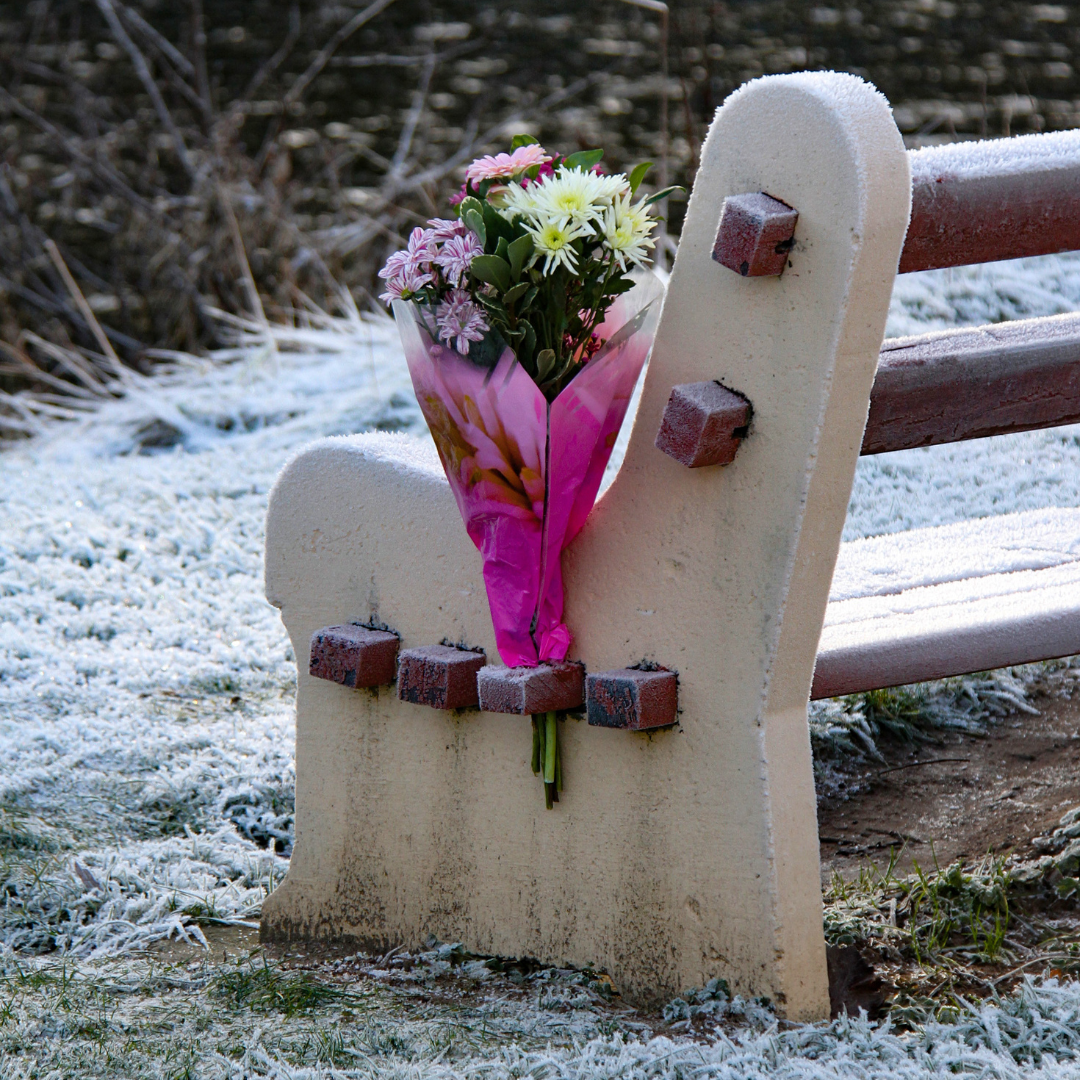 I started thinking about grief in the context of this work when one of our friends from the street died, and I felt like I had no place to put this grief. When a close friend or a family member dies, there is an expected course of suffering. Everyone around you understands what that looks like and there is no explanation needed for why you are grieving. But when one of our patients dies, I felt like I had no box I could put this grief into that would make sense to anyone outside of our work. I couldn’t expect even my friends who work in other areas of health care to understand. Comparative suffering has no place in grief, but I find it to be a natural response. In my community of street medicine providers, I had the sense that I needed “permission” to grieve, and that grief was only acceptable if I really knew the person best or longest or cared about them the most. I didn’t feel as though I was allowed a seat at the grief table if I couldn’t give a reason for being there. In hindsight, I can acknowledge that much of this was my own psyche, but in talking with colleagues I have found that many others felt similarly. So what do we do with this grief? What box does it fit into?
I started thinking about grief in the context of this work when one of our friends from the street died, and I felt like I had no place to put this grief. When a close friend or a family member dies, there is an expected course of suffering. Everyone around you understands what that looks like and there is no explanation needed for why you are grieving. But when one of our patients dies, I felt like I had no box I could put this grief into that would make sense to anyone outside of our work. I couldn’t expect even my friends who work in other areas of health care to understand. Comparative suffering has no place in grief, but I find it to be a natural response. In my community of street medicine providers, I had the sense that I needed “permission” to grieve, and that grief was only acceptable if I really knew the person best or longest or cared about them the most. I didn’t feel as though I was allowed a seat at the grief table if I couldn’t give a reason for being there. In hindsight, I can acknowledge that much of this was my own psyche, but in talking with colleagues I have found that many others felt similarly. So what do we do with this grief? What box does it fit into?
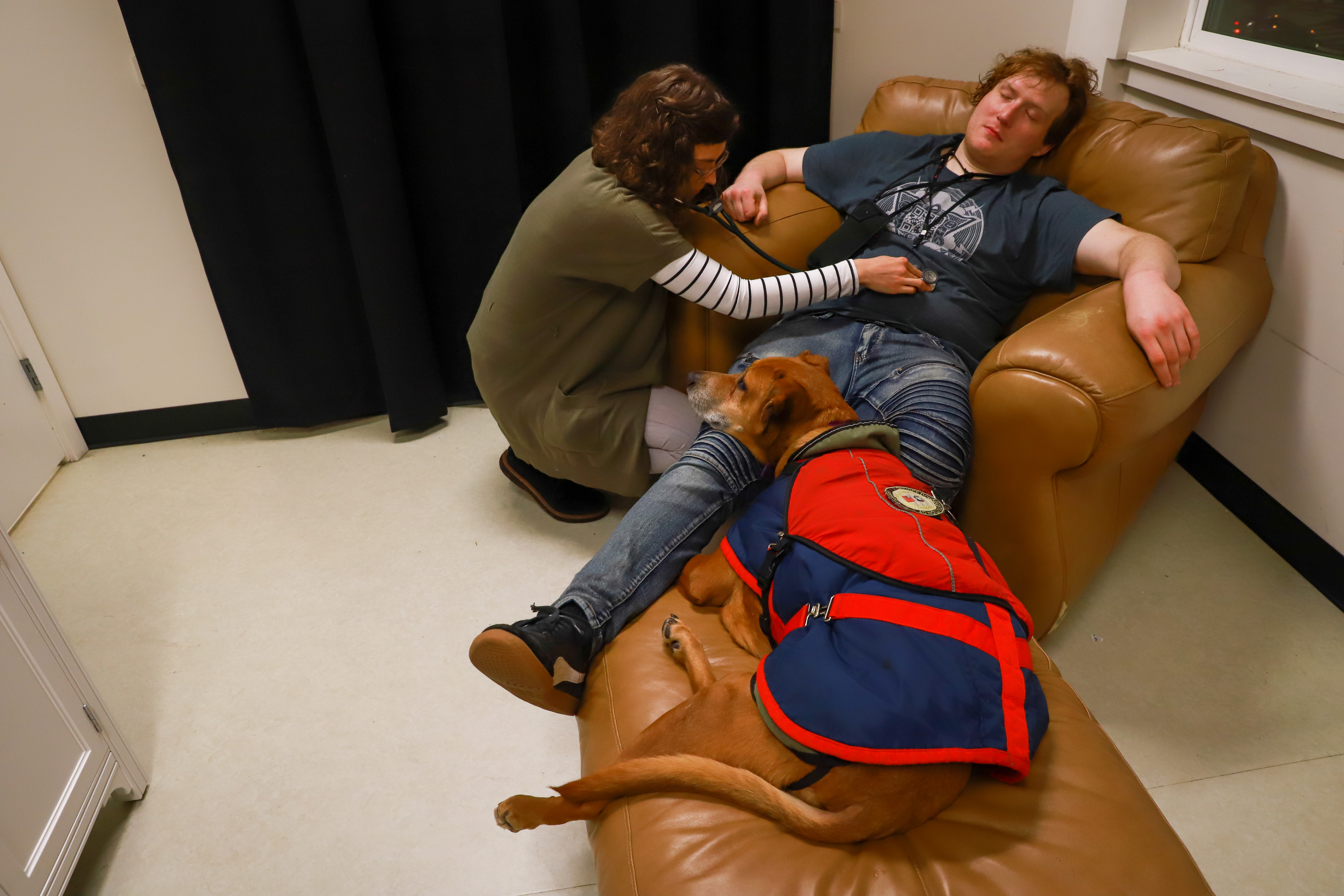 For those of us who work with and within communities experiencing homelessness, we know the value that a companion animal (or emotional support animal or service animal) can have for someone living unhoused. That animal may be the sole trusted companion, and the one who does not judge and loves unconditionally. It may be the one who provides a purpose in life, whether it is something to care for, get out of bed for, or survive for. As someone once told us, “[My pet] is just real happy just to see me exist.”
For those of us who work with and within communities experiencing homelessness, we know the value that a companion animal (or emotional support animal or service animal) can have for someone living unhoused. That animal may be the sole trusted companion, and the one who does not judge and loves unconditionally. It may be the one who provides a purpose in life, whether it is something to care for, get out of bed for, or survive for. As someone once told us, “[My pet] is just real happy just to see me exist.”
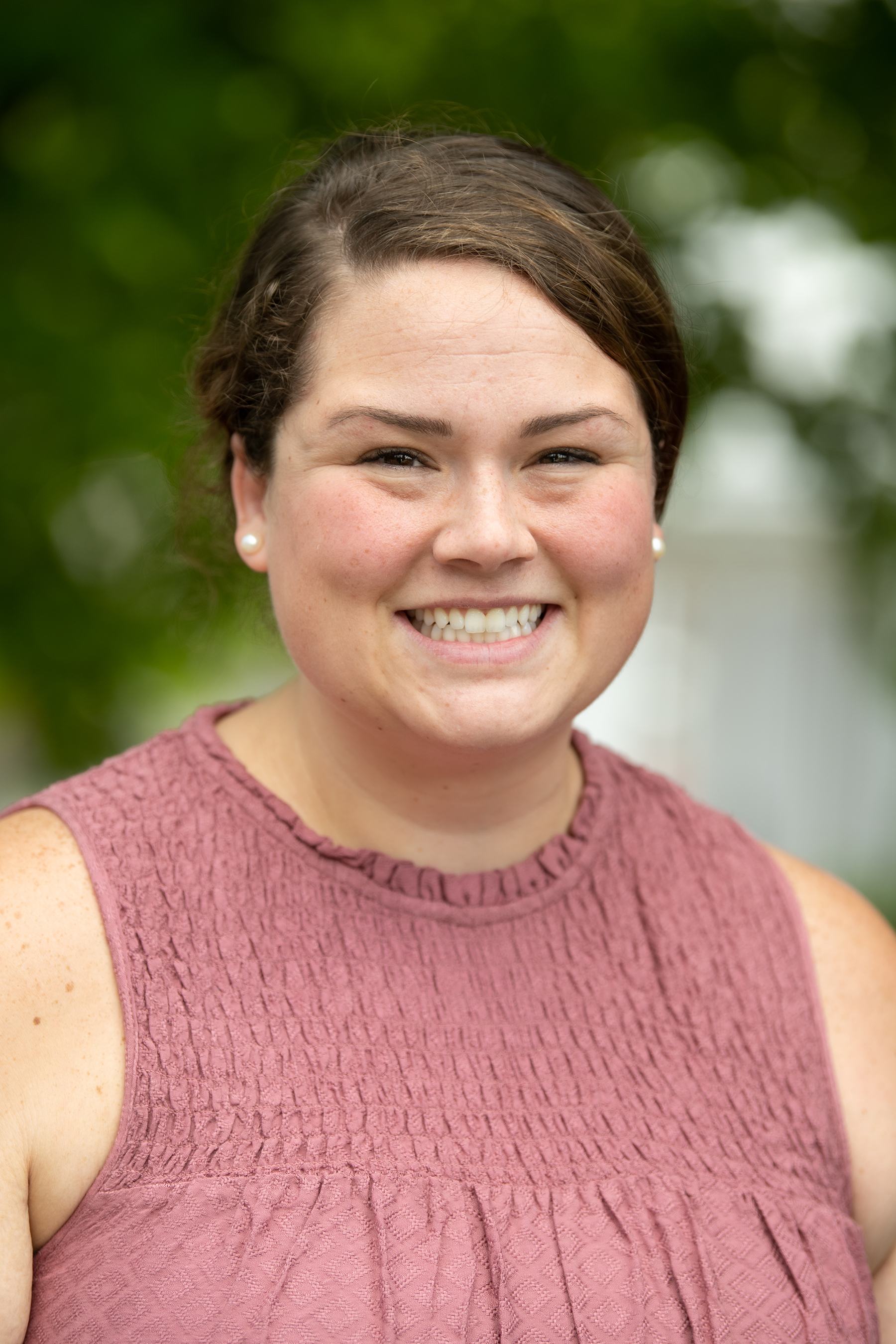 My name is Marisa Charley, and I work and teach in the Shepherd Program for Poverty and Inequalities Studies at a university in Lexington, VA. Our mission is to understand and address the causes and consequences of poverty and inequalities in ways that respect the dignity of every person.
My name is Marisa Charley, and I work and teach in the Shepherd Program for Poverty and Inequalities Studies at a university in Lexington, VA. Our mission is to understand and address the causes and consequences of poverty and inequalities in ways that respect the dignity of every person.
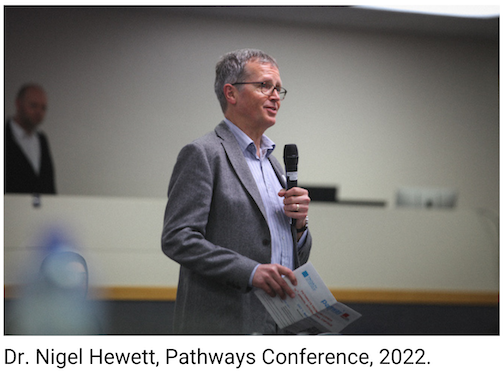 Tribute to Dr. Nigel Hewett by Andrew Hayward, Director of the UCL Institute of Epidemiology and Health Care and Co-Director of the UCL Collaborative Centre for Inclusion Health and colleagues at CCIH
Tribute to Dr. Nigel Hewett by Andrew Hayward, Director of the UCL Institute of Epidemiology and Health Care and Co-Director of the UCL Collaborative Centre for Inclusion Health and colleagues at CCIH
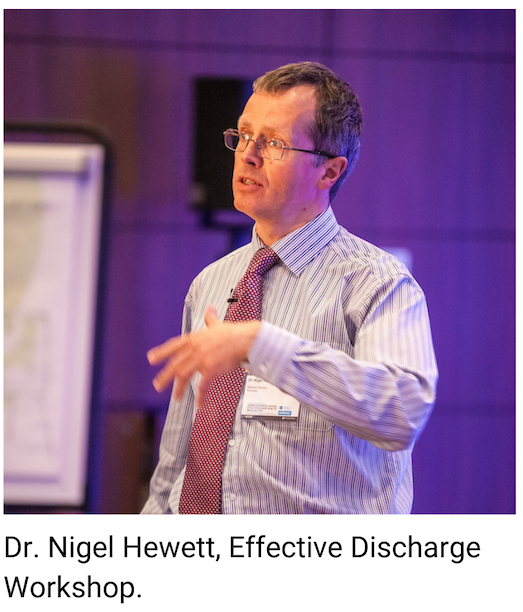 Dr. Nigel Hewett retired this summer after 12 years as the founding medical director of Pathway. He was also the founding Secretary and the driving force behind the development of the UK Faculty for Homeless and Inclusion Health, which we launched in 2011. I first met Nigel when Pathway’s founder, Professor Aidan Halligan, invited me to see a new specialist homeless service at University College Hospital in London (I didn’t realize at the time but Aidan was also checking me out as a potential CEO, for an organization that didn’t yet exist). Nigel was there following a similar experience.
Dr. Nigel Hewett retired this summer after 12 years as the founding medical director of Pathway. He was also the founding Secretary and the driving force behind the development of the UK Faculty for Homeless and Inclusion Health, which we launched in 2011. I first met Nigel when Pathway’s founder, Professor Aidan Halligan, invited me to see a new specialist homeless service at University College Hospital in London (I didn’t realize at the time but Aidan was also checking me out as a potential CEO, for an organization that didn’t yet exist). Nigel was there following a similar experience.
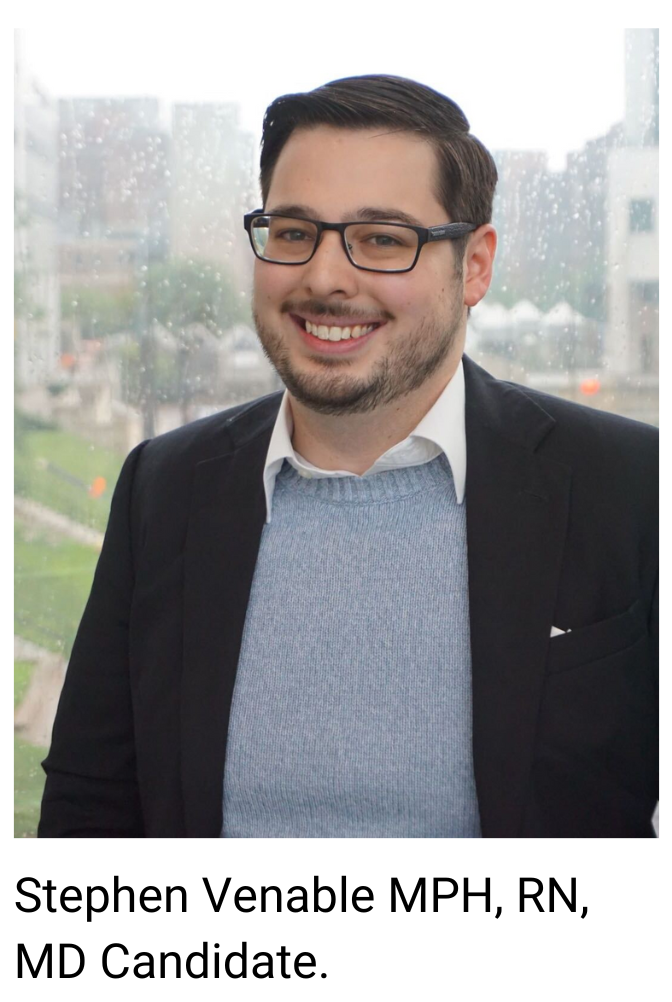
Dear Street Medicine Family,
As the year prepares for its end, we would like to take a moment to thank the Street Medicine Institute Student Coalition Board of 2021/2022 for all their hard work and dedication. This includes our outgoing Chief Coordinator, Sophie Roe, who has been an exemplar of leadership, dedication, and kindness throughout the last year. During her time leading SMISC, she has helped strengthen the core of our organization, and I know that, due to her efforts, we stand in a much better position to help our fellow students care for our friends on the street. We also wanted to wish the best to our outgoing board members Kerina Yao and Sarah Hludzinski as they move on to their next phases. We know that they both will continue making a difference in the lives of others no matter where they go, and we could not be prouder of them for it.
 There were many facets of the COVID-19 pandemic that considerably impacted the lives of persons experiencing homelessness. In response, individuals and families composing the homeless population adapted. The same was true for organizations serving the community. Shelters adapted their floor plans to increase “social distancing”; large-venue congregant shelters opened to accommodate the increased numbers of individuals who found themselves without housing; restrictions on outdoor camping were loosened which in turn made homelessness far more visible; cities struggled with new issues of allowing ‘tent cities’ in parks and parking lots regardless if they were officially sanctioned or not; agencies serving the population fiscally re-evaluated increased need for services with decreased funding from donations; everyone worried about the virus and simply surviving through the worst of the pandemic.
There were many facets of the COVID-19 pandemic that considerably impacted the lives of persons experiencing homelessness. In response, individuals and families composing the homeless population adapted. The same was true for organizations serving the community. Shelters adapted their floor plans to increase “social distancing”; large-venue congregant shelters opened to accommodate the increased numbers of individuals who found themselves without housing; restrictions on outdoor camping were loosened which in turn made homelessness far more visible; cities struggled with new issues of allowing ‘tent cities’ in parks and parking lots regardless if they were officially sanctioned or not; agencies serving the population fiscally re-evaluated increased need for services with decreased funding from donations; everyone worried about the virus and simply surviving through the worst of the pandemic.
Jim Withers, MD and Joel Hunt, PA 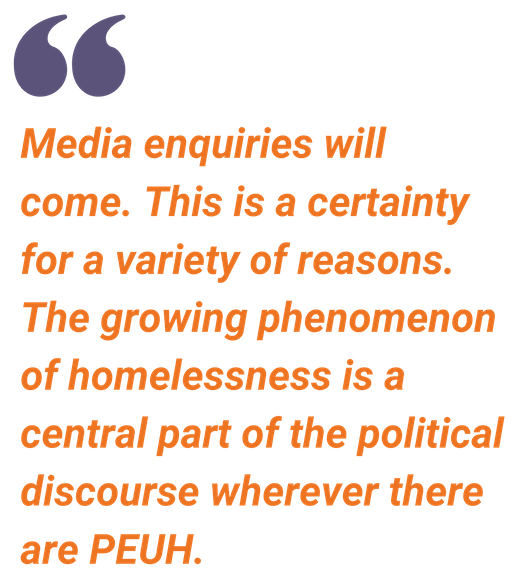 The act of providing direct medical care to those living on the streets is not just an important service, but one that provokes society. Time and again, street medicine programs activate the attention of the public and the media. This is an almost guaranteed part of the street medicine journey and deserves discussion. This paper is not a definitive work on the subject of media relations, but hopefully serves as a guide based on many decades of experience by street medicine experts.
The act of providing direct medical care to those living on the streets is not just an important service, but one that provokes society. Time and again, street medicine programs activate the attention of the public and the media. This is an almost guaranteed part of the street medicine journey and deserves discussion. This paper is not a definitive work on the subject of media relations, but hopefully serves as a guide based on many decades of experience by street medicine experts.

Dr. Jim Withers is the Founder of the Street Medicine Institute. The Institute evolved as an off-shoot of his groundbreaking work with Pittsburgh Mercy's Operation Safety Net, the street medicine program he established and continues to work with in Pittsburgh, PA. Dr. Withers describes his experience with street medicine in his Ted Talk here.
At the heart of both street medicine and human rights stands one animating principle: dignity. Anyone who practices street medicine understands that homelessness constitutes an affront to human dignity. To bear witness to systemic violations of human dignity, and stand in solidarity with those who experience it, is the daily work of street medicine practitioners. Practitioners in this field can vividly describe the dehumanization experienced by people who are unhoused – ritualized in our legal systems, our social services, our streets, our schools, and yes – our healthcare systems.